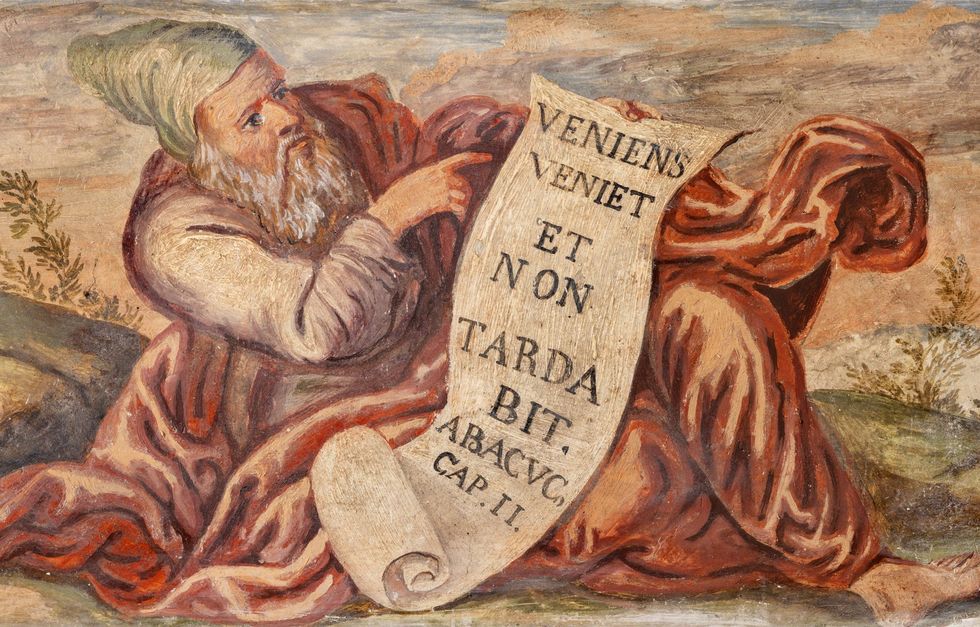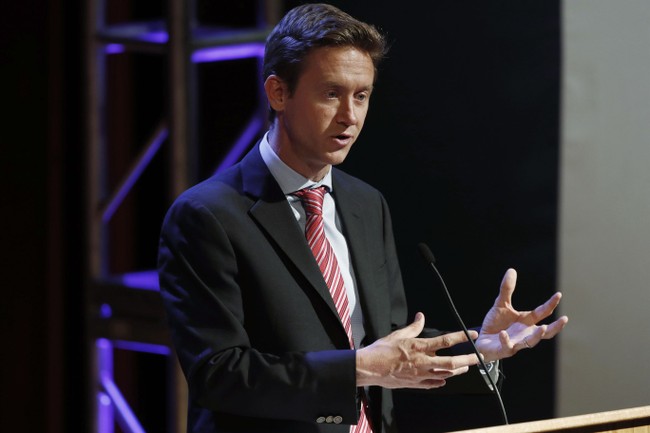Meet the atypical biblical prophet who empowers us to navigate a godless culture

Life feels heavy. We’re seeing wars break out, hurricanes wreak havoc, violent crimes being committed against children, election insanity, perversion at every corner, and what feels like constant “bad news” with morally bankrupt people doing morally bankrupt things.
It’s exhausting, and I know I’m not alone in feeling this way. Every day it seems like we’re living more and more in Babylonian times, but this isn’t the first time in history it’s been this way.
‘I am doing a work in your days that you would not believe if told.’
Tucked in with the other “minor prophets” in the Bible is the book of Habakkuk. We’re not given much information about Habakkuk, but we know he was an atypical prophet who many believe wrote his book after the fall of Nineveh and before the Babylonian capture of Jerusalem. Habakkuk differentiates himself from other prophets since there’s no indication that God asked him to be prophet. Rather, he seems to seek the role out. At this point in history, it was morally dark, especially for those pursuing righteousness and speaking truth like Habakkuk. Strife and contention ruled the land, justice wasn’t served, and “destruction and violence” were ever before Habakkuk and God’s people.
In this short three-chapter book, Habakkuk finds himself discouraged and weary. He struggles with having faith in God while grappling with all the injustice in the world. He cries out to God for help, questioning why God isn’t saving the people from grave evil. Everything he’s ever known is being destroyed and overtaken by pagans.
But we have to remember: God had been faithful time and time again even though His people had been continually unfaithful to Him. The rise of the Babylonian empire and the destruction of Jerusalem were a direct punishment for the sin of God’s people.
God responds to Habakkuk’s cry by inviting him to “look” and “see” among the nations and be astounded. God then tells Habakkuk He’s raising up the Chaldeans, the ruling class of the Neo-Babylonian empire — a gruesome people who viewed their “might” as their god. They placed their confidence wholly in their strength and their strength alone.
It seems odd for this to be God’s response to the distressed prophet, but God doesn’t sugarcoat the situation. God says, “I am doing a work in your days that you would not believe if told” (Habakkuk 1:5). Here, God is inviting Habakkuk to trust Him even though Habakkuk doesn’t understand why the Babylonians continue plundering his homeland, though God assures him that eventually the Babylonians will “sweep by like the wind” (Habakkuk 1:11).
In spite of God’s challenge for Habakkuk to wait and trust Him, he is still depressed, so he returns to the Lord a second time. He ends his plea asking the Lord if “mercilessly killing nations” will continue. This time, after laying out his raw plea to God, similarly to a Psalm of David, Habakkuk stands at his watch post, stationing himself on the tower.
We don’t know how long he waits, but we know God answers him.
God doesn’t always let us in on what He’s doing or why He’s doing it.
Instead of telling Habakkuk to observe, God calls him to take action. The Lord directs him to write down the “vision,” which was God’s original response to Habakkuk’s first plea: “Write the vision; make it plain on tablets” (Habakkuk 2:2).
Since the weary prophet didn’t heed God’s message the first time, God tells him to inscribe it. By doing this, God’s message can more concretely sink into his heart and mind, where it can be more fully imprinted. There will be an appointed time when the Babylonians are punished, but that appointed time is not yet.
“If it seems slow, wait for it,” God urges Habakkuk in 2:3.
The Lord makes it clear that His timing is everything and His plans are unfolding even if Habakkuk doesn’t understand God’s intended purpose or the timing of it.
“The righteous shall live by his faith,” the Lord gently reminds him in 2:4.
During a time of justice being perverted and evil abounding, God wasn’t absent even though Habakkuk felt like He was.
Time and time again we ask God “why” and we find ourselves doubting His goodness when we see so much evil around us, as Habakkuk did so many years ago.
God doesn’t always let us in on what He’s doing or why He’s doing it. Sometimes it might be because it’s too heavy a load for us if we knew all the details or could peek into the future. But with goodness and kindness, God listened, responded, and reminded Habakkuk of His unchangeable character.
God is doing the same for us in our day and our culture.
Even though the world feels like it is caving in on us and things seem bleak as our world embraces moral relativism — people doing what is right in their own eyes — we know God is in control and reigns on His throne.
Though his circumstances are grim and his homeland is desolate, Habakkuk orients his heart toward hope and truth.
After the back-and-forth dialogue, Habakkuk concludes by praying. He positions his heart toward God in an act of worship, giving praise to the Lord. His circumstances have not changed, but his perspective completely shifts. Even though the fig trees don’t blossom and there’s no fruit on the vines or herd in the stalls, Habakkuk says, “Yet I will rejoice in the Lord; I will take joy in the God of my salvation” (Habakkuk 3:18).
The Lord is His strength while his enemies make an idol out of their own strength. Habakkuk is reminding himself of God’s character, strength, and infinite power. His confession of faith draws him to pronounce, “He [God] makes my feet like the deer’s; he makes me tread on my high places” (Habakkuk 3:19). Here, when Habakkuk refers to a “deer,” he uses a Hebrew word that means “female deer” or “hind.”
These graceful, sure-footed animals are more lightly built than male deer, making them more agile. They are revered for their stability in climbing mountains, cliffs, and rocky terrain without falling. A hind won’t tread on anything that’s not secure and steady under her feet. Just as the female deer is confident in her movement through rugged topography, so are we to be confident through life’s uncertain adversity.
What a powerful picture of Habakkuk’s inner strength rooted in God.
Though his circumstances are grim and his homeland is desolate, Habakkuk orients his heart toward hope and truth. He went from deeply discouraged to rejoicing in the Lord. Nothing changed except his perspective. Habakkuk went from looking at his circumstances to beholding God — and that made all the difference. Just as the hind climbs up steep cliffs without losing her footing, God gives us the same ability to navigate the rough terrain of life and the hardships that often feel unbearably heavy. His strength, not ours.
I find myself feeling like Habakkuk did centuries ago. Our current situation may not be as dire as Jerusalem’s under siege, but we nonetheless see enough challenges in our day to relate to Habakkuk’s state of despondency.
Living in a godless society where our moral fabric continues to unravel rapidly feels wearisome, but we can learn a powerful lesson from this prophet of old: Confidently, we can trust in God, who reigns supreme over all.









